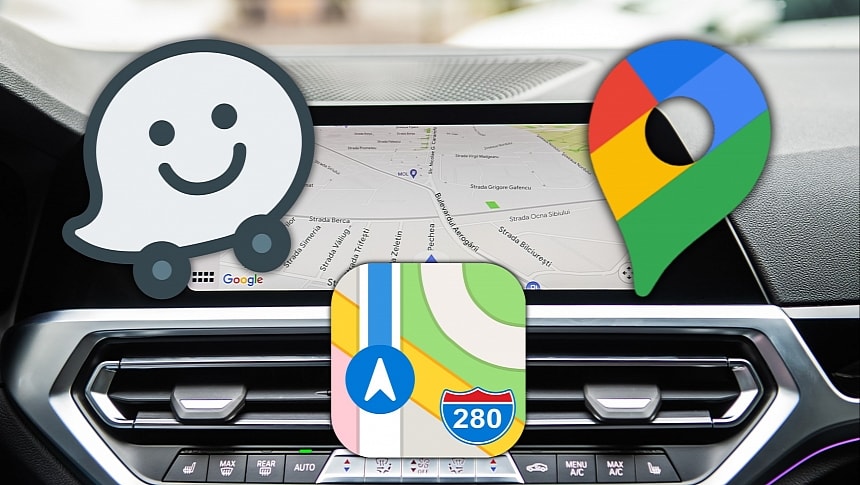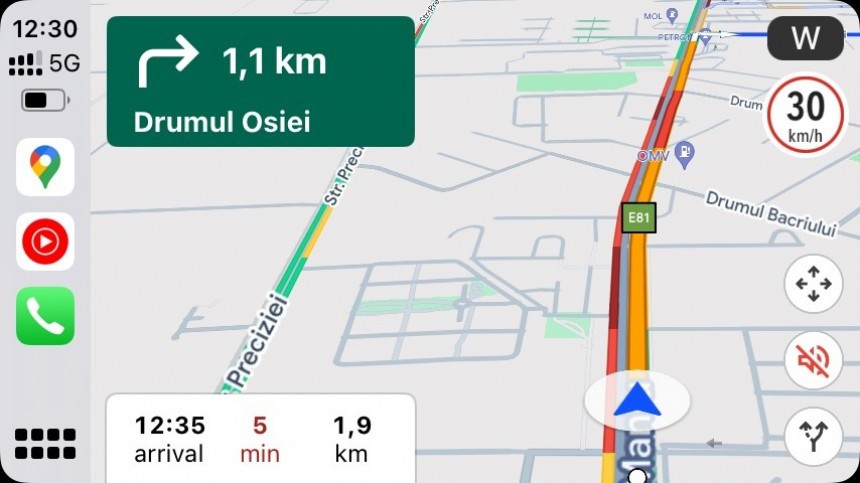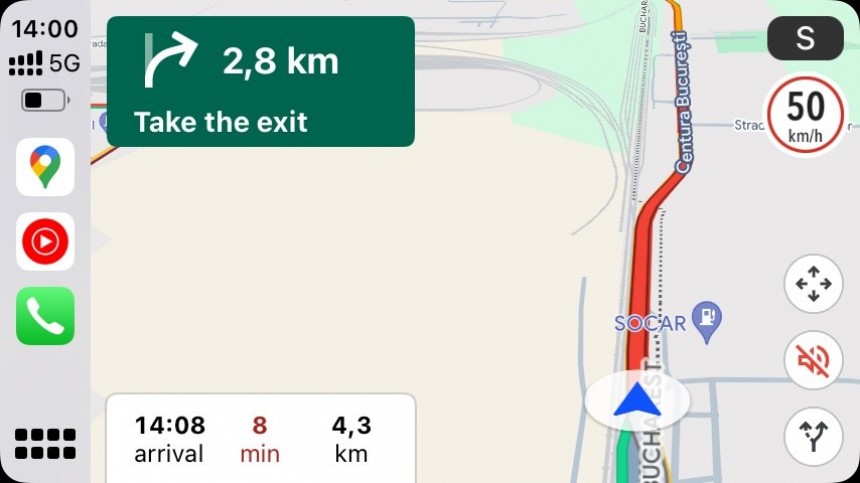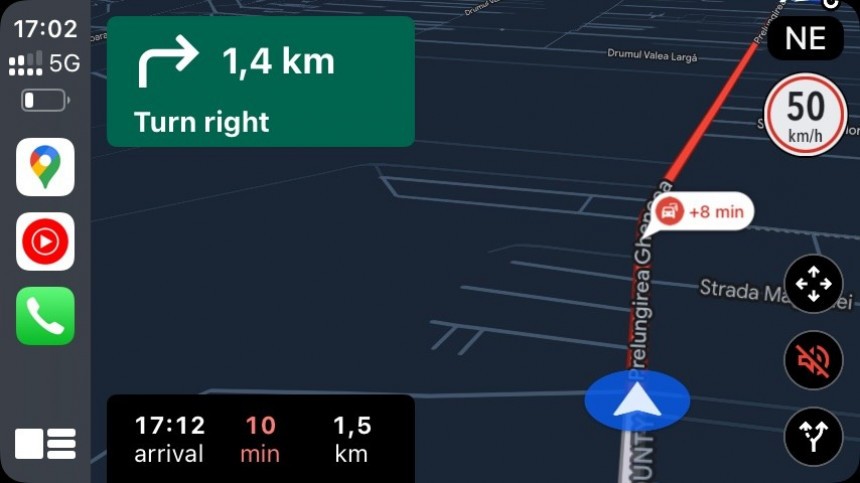Google Maps is often considered the world's number one mobile navigation app, followed by Waze and Apple Maps, in this exact order.
However, with Apple becoming more committed to improving Apple Maps, the adoption of this Google Maps alternative keeps growing, especially in the regions where the detailed city experience is already available.
Apple's detailed city experience is the biggest Apple Maps overhaul in history, comprising Apple's in-house maps, Look Around, new navigation features, Waze-inspired incident reporting, and 3D buildings with rich details.
Google Maps and Waze are also getting new capabilities, so the competition in the navigation space remains fierce.
A new survey conducted by MarketWatch Guides in the United States and based on a thorough analysis of data from Speedtrap.org and the answers offered by 1,000 respondents reveals that Google Maps is still the number one navigation app.
More surprisingly, Google Maps dominates the navigation space with an impressive 70% share, more than double the share of Waze. Only 27% of the respondents said they use Waze for navigation, while Apple Maps secured third place with 25%. The detailed city experience is already available in several US regions, so Apple Maps is considered a worthy alternative to Google Maps, also packing incident reporting to replace Waze.
The survey also analyzes speeding tickets and driving behaviors in the United States, with Waze serving as the preferred choice for drivers who want to receive alerts about speed traps. Users consider Waze 30% more effective than Google Maps, despite the latter still running in most cars where drivers "typically drive over the speed limit."
Waze uses a crowdsourcing reporting system, allowing users to flag road incidents and hazards on the map. When Waze receives a report, it collects data to generate warnings for other motorists whose routes go through the same locations. Waze supports a wide range of reports, including speed traps, accidents, vehicles stopped on the road, and roadkill.
The survey reveals that over one-third of the respondents used a navigation app and received warnings about a speed trap ahead. Not everybody takes these reports for granted, and 6% of the drivers who ignored the warnings got a speeding ticket.
The more shocking part reveals how drivers behave after getting a speed ticket. 30% of the respondents said they continued to drive faster than the speed limit after receiving a ticket, though 16% admitted they paid more attention to navigation apps. Only 47% of the drivers said they paid "closer attention to speed limits, " and 25% said they embraced more defensive driving.
Delaware is the US state with the most speed traps per lane mile, followed by Maryland, Tennessee, and South Carolina. Hawaii, Virginia, and California are next.
30% of Americans admitted they received a speeding ticket, and millennials are 50% more likely to exceed the limit than baby boomers.
The rankings are likely significantly different in Europe, where Apple rolls out the detailed city experience at a frustratingly slow pace. Google Maps and Waze dominate the navigation space on the Old Continent, with the latter often picked as the preferred driving companion primarily thanks to its incident reporting engine.
Apple Maps is also far from becoming a fully featured Waze alternative. The application currently supports only three report types: speed traps, accidents, and other hazards. Waze packs more report types, including broken traffic lights, potholes, and multiple police traps. I wouldn't be surprised to see Apple improving Apple Maps in this regard, but the company's focus is currently on bringing the detailed city experience to all users. Apple hasn't shared an ETA regarding the broad availability phase of this Apple Maps overhaul.
Additionally, Waze is also getting new capabilities that make every journey more predictable, with the latest update adding speed bumps and sharp curve warnings.
Despite still receiving navigation improvements, Google Maps is also focusing on non-navigation updates, as Google's focus is turning the software into an all-in-one mapping solution.
And to answer the question in everybody's mind, Google isn't yet planning to merge Google Maps and Waze. I posted a story on this topic not long ago, explaining why Google doesn't want Google Maps and Waze to merge into a single solution, but the search giant's plans can always change according to its long-term plans. However, Google Maps and Waze are still different beasts with separate futures, with the latter focusing entirely on traffic navigation and the incident reporting system.
Google Maps will remain the all-in-one product with features not available in Waze, including offline navigation and state-of-the-art map exploration with store information, busyiness data, and reviews for nearly every location worldwide.
Apple's detailed city experience is the biggest Apple Maps overhaul in history, comprising Apple's in-house maps, Look Around, new navigation features, Waze-inspired incident reporting, and 3D buildings with rich details.
Google Maps and Waze are also getting new capabilities, so the competition in the navigation space remains fierce.
A new survey conducted by MarketWatch Guides in the United States and based on a thorough analysis of data from Speedtrap.org and the answers offered by 1,000 respondents reveals that Google Maps is still the number one navigation app.
More surprisingly, Google Maps dominates the navigation space with an impressive 70% share, more than double the share of Waze. Only 27% of the respondents said they use Waze for navigation, while Apple Maps secured third place with 25%. The detailed city experience is already available in several US regions, so Apple Maps is considered a worthy alternative to Google Maps, also packing incident reporting to replace Waze.
Waze uses a crowdsourcing reporting system, allowing users to flag road incidents and hazards on the map. When Waze receives a report, it collects data to generate warnings for other motorists whose routes go through the same locations. Waze supports a wide range of reports, including speed traps, accidents, vehicles stopped on the road, and roadkill.
The survey reveals that over one-third of the respondents used a navigation app and received warnings about a speed trap ahead. Not everybody takes these reports for granted, and 6% of the drivers who ignored the warnings got a speeding ticket.
Delaware is the US state with the most speed traps per lane mile, followed by Maryland, Tennessee, and South Carolina. Hawaii, Virginia, and California are next.
30% of Americans admitted they received a speeding ticket, and millennials are 50% more likely to exceed the limit than baby boomers.
A personal take
While Google Maps is the number one navigation app in this survey, it's important to remember that the figures concern only the American market, where Apple Maps is also considered a top alternative.The rankings are likely significantly different in Europe, where Apple rolls out the detailed city experience at a frustratingly slow pace. Google Maps and Waze dominate the navigation space on the Old Continent, with the latter often picked as the preferred driving companion primarily thanks to its incident reporting engine.
Additionally, Waze is also getting new capabilities that make every journey more predictable, with the latest update adding speed bumps and sharp curve warnings.
Despite still receiving navigation improvements, Google Maps is also focusing on non-navigation updates, as Google's focus is turning the software into an all-in-one mapping solution.
And to answer the question in everybody's mind, Google isn't yet planning to merge Google Maps and Waze. I posted a story on this topic not long ago, explaining why Google doesn't want Google Maps and Waze to merge into a single solution, but the search giant's plans can always change according to its long-term plans. However, Google Maps and Waze are still different beasts with separate futures, with the latter focusing entirely on traffic navigation and the incident reporting system.
Google Maps will remain the all-in-one product with features not available in Waze, including offline navigation and state-of-the-art map exploration with store information, busyiness data, and reviews for nearly every location worldwide.


















